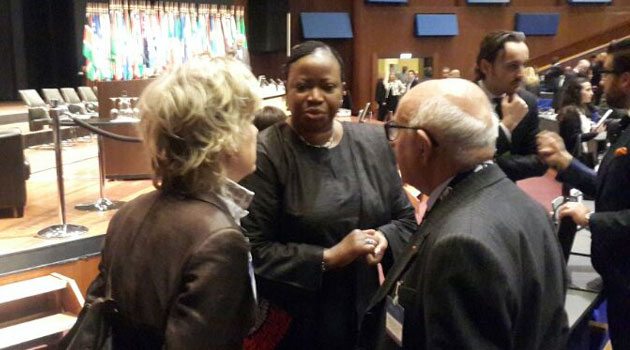
The Trial Chamber, by majority, found that the amendment to Rule 68 of the court’s rules and procedures on which ICC Prosecutor Fatou Bensouda based her applicatio/file
The Trial Chamber, by majority, found that the amendment to Rule 68 of the court’s rules and procedures on which ICC Prosecutor Fatou Bensouda based her application, could be applied in the Ruto-Sang case.
Ruto and Sang’s defence had argued that amendment to the rule allowing for prior recorded statements to be admitted into evidence shouldn’t apply in the case as its passage by the Assembly of State Parties to the Rome Statute in November of 2013 was impinged on it not being applied retrospectively.
But the chamber found that it was a matter of interpretation and that by allowing this argument, they would be hindered in carrying out of their function.
In April, Bensouda applied to have the prior recorded statements of six of her witnesses admitted into evidence after one ‘disappeared’ and five others recanted testimony on the stand.
The chamber has however declined to admit into evidence the prior recorded statement of one of the six witnesses on the grounds, “the Prosecution accepts in its request that there is little direct evidence of improper interference with this witness.”
The chamber found that it was not necessary, as the defence argued, to tie the alleged witness tampering directly to the accused as it was allegedly carried out for their benefit.
It also found that it was necessary for the prosecutor “to prove beyond a reasonable doubt” the allegations of witness tampering.
It agreed with the Prosecutor that, “that for procedural filings, such as this one, the existence of facts should be established by the relevant party on the basis of a balance of probabilities.”
“The chamber notes the element of systematicity of the interference of several witnesses in this case which gives rise to the impression of an attempt to methodically target witnesses of this case in order to hamper the proceedings. The chamber will not allow such hindrance and will safeguard the integrity of the Proceedings,” it made clear.
The defence had argued that the prior recorded statements shouldn’t be admitted into evidence as they were not taken under oath nor was there the threat of liability for false statements.
But the chamber found that the fact that the witnesses appended their signatures to the statements “to the best of their knowledge” the statements could in fact be admitted into evidence.
The defence also challenged the reliability of the statements on the grounds that they were written in English but when those who’d recanted their statements took the stand, it was clear that they were not fluent in the language “and (testimony) ended up being in Swahili with English interpretation.”
The motivation for making the prior recorded statements, the defence also argued, was suspect as a number of witnesses, when they took the stand, testified that they were motivated by the promise of an easier life in the West in exchange for their testimony.
But the chamber stated that it would exercise its discretion in determining the truth of the statements.









































